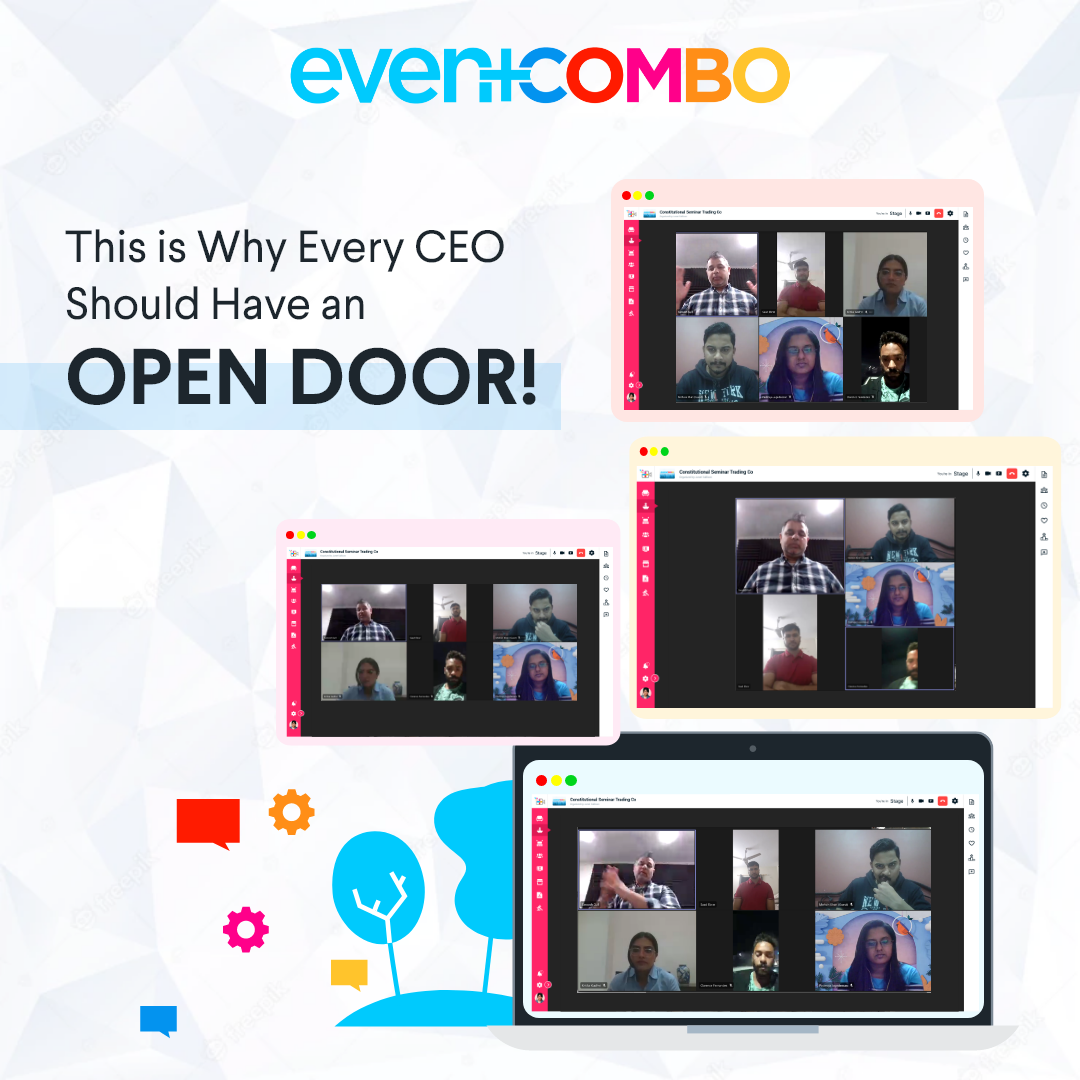

Having an Open-door policy at work - what does it actually mean?
An open-door policy workplace in simple terms means that a CEOs ear and door is literally open to listen, acknowledge and take action on what every employee in the organization has to say. The goal is to ensure a two way-open communication, allowing for honest feedback, no judgement, discussing important matters of concern to the individual or to departments or the entire organization. An open-door policy gives a transparent platform for every employee to be comfortable in the culture they are helping to build. It can also act as a platform to identify leaders who a CEO can mentor and coach to achieve their hidden potential. Above all, such a policy adheres to a no consequence or worry on behalf of employees for sharing concerns. In other words, no negative outcome.
Eventcombo is an organization that has always believed in adapting such best practices and in some cases, breaking the mold in introducing what is considered impossible in organizations where the bottom line dictates your path. Meanwhile, please also check out our 5 tips to future proof your brand, so that your business is secure no matter what challenges come ahead.
Since employees are the most valuable asset of any organization, individuals from different walks of life, connecting together from diverse backgrounds, educational qualifications, come and work towards achieving a common organizational goal – no matter what structure you implement, and structure is important, team members always have a need to connect and can help an organization grow through direct feedback. If employees are happy and content, they will put their best foot forward to help achieve the common organizational objective.
What are the advantages of having an open-door policy?
There are several advantages of having an open-door policy. To build a healthy work culture for employees, encourage an open communication with management, help employees put forward their ideas (some of them are pretty terrific!). All this in turn enable a CEO or manager to maintain a closer working relationship with one another. Let us take a closer look at some of these advantages.
1. Ease of access
CEOs and managers who are easily available for their employees at all times have proven to create a secure work environment for their workforce. It also enables them to stop by and bring to light issues, which may need immediate attention. This gives managers and CEOs a clearer picture and a “throb” of what is going on in the department and company as a whole, on a regular basis. Many a disaster can be averted by this practice.
2. Openness and transparency
An open-door policy at any workplace boosts morale of employees. Not just that it also fosters a culture of transparency, by creating a work environment where everyone gets a platform to raise concerns. It makes employees feel that their opinion and voice matters. This way, management also gets to be a part of more informal discussions – since, these conversations sometimes give important business insights. Any management that shuts the door more often is not actually in loop with what’s happening in the department and this leads to small and large failure.
3. Fast flow of information/ideas
An open-door policy encourages employees to come up with creative ideas, or raise concerns. In a fast-paced world having quick access to information is the key to success. When management is beyond the reach of employees, this eventually prevents employees (even to report serious concerns) to reach out, hence creating a barrier to growth and innovation.
4. Open culture creates a close working relationship!
In order to promote a culture of openness, managers and CEOs should actively engage with their employees on a regular basis. Since, regular communication encourages an open work culture and creates a more intact work bond among fellow employees. On the other hand, a closed work culture, will generate a feeling of resistance, rigidity, and formality. Such feelings may cause isolation among some and negatively impact relationships among team members.
Implementing open door policies
We have just witnessed above; how open-door policies can do wonders (and not having one can do the opposite). The best way to implement such a policy is to draw certain guidelines. The guidelines will include a proper framework as to how it will work from CEO, to directors, managers and further down the ladder. For instance, there can be a proper schedule for particular day(s) in a month, where a CEO will have an open forum with all the employees (department wise) or on a one-on-one basis. The one-on-one basis can be scheduled on a request basis. One of the factors to keep in mind is, an open-door policy should be treated to address genuine work-related concerns. The main idea is to address small issues in time before it turns into a major problem.
Eventcombo’s open door policy, a game changer!
One of the best practical implementations of open-door policy has been achieved by Eventcombo.
Our CEO, believes in building a work culture that values every voice and addresses concerns, if any, by any employee. The open-door forum is done on a bi-weekly basis on alternate Fridays. Here, all employees are free to raise concerns, give suggestions, propose new ideas for the betterment of the organization. This practice has enabled employees to share their ideas and talk about issues which would otherwise not have gotten addressed.
Since, Eventcombo has a remote work culture, there have been regular employee engagement activities on Fireworks™ by Eventcombo. This is done to foster communication among its employees, get them to know each other “outside” the work place. One of its most successful companies offsite was their virtual Halloween bash!

The economics of trade shows have shifted. Yet the ROI conversation is still murky. As trade show costs rise, budgets aren't keeping pace, creating pressure on event organizers.

If you’re an event organizer, you know the drill. Event goals often sound fantastic in the initial brainstorming session, but when it’s time for execution, they can easily collapse.

Let’s be honest: there was a time when great content and a catchy title were enough to pull in a crowd. But today, events have become a go-to marketing play, and now, everyone’s in the game.